Timeline: a look back at the life of the QE2
This year marked the 50th anniversary of the iconic QE2 cruise liner. Now moored as a floating hotel in Dubai’s Port Rashid, Ross Davies looks back at her colourful history, from playing a pivotal role in the Falklands conflict to surviving 95ft rogue waves.
shutterstock.com/Umomos
I
By the time the QE2 left the docks of Southampton in late 2008 – for what would be her final ever voyage – she had sailed over six million nautical miles and hosted 2.5 million passengers over a 39-year career.
It brought to a close what had been a colourful history. Over the years, the iconic liner counted amongst its well-heeled patrons various members of the British royal family, as well as Nelson Mandela, Elizabeth Taylor and George Harrison.
Across its lifetime, the QE2 also encountered bomb threats; played a role in the Falklands conflict; rescued 500 passengers from a burning naval ship; and survived a 95ft rogue wave – all before finally being decommissioned and sold to become a floating hotel in Dubai in the year of the great recession.
Then the story went cold. Years passed and many wondered whether the QE2, moored and inactive the Gulf city state, would ever see life again. Rumours persisted of those hotel conversion plans having fallen through; instead, it appeared, she was doomed for the scrapyard.
But in a case of better late than never, the QE2 did finally open its doors as a hotel on Port Rashid in 2018, and this year celebrated its 50th birthday.
Thankfully, the property doffs its cap to its heritage, its refurbishments based on the ship’s original design, from its porthole windows and artwork to carpets and even restaurant menus.
That said, in its stationary capacity, it is doubtful the QE2 will ever lead such an evocative existence as she did on the high seas. Below is a timeline of the liner’s most memorable moments.
2 May 1969
The maiden voyage
The Cunard liner embarks on her maiden transatlantic voyage. Despite persistent rain, well-wishers descend upon the port of Southampton – amid a sea of balloons and streamers – to wave the ship off from her berth towards New York.
Carrying 1,400 passengers and a 928-strong crew, the QE2 arrives in Manhattan exactly four days, 16 hours and 35 minutes later, making her the world’s fastest passenger ship.
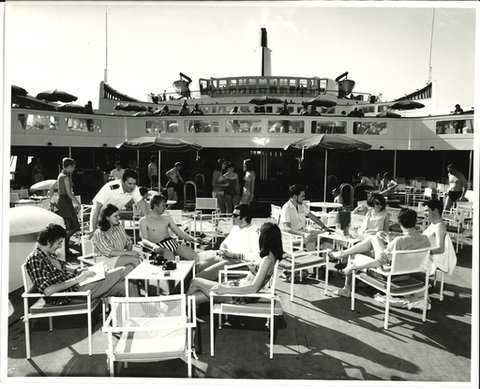
Image courtesy of The University of Liverpool Library, Cunard archive
8 January 1971
the rescue of the Antilles
While passing through the Caribbean, the QE2 rescues passengers from Antilles, a French liner, which had run aground on fire close to Mustique.
Braving heavy seas and strong winds in the middle of the night, the liner successfully conducts the transfer aboard of 501 Antilles passengers from the beaches of the tiny island.
17 May 1972
bomb threats and a hoax
En route from Southampton to New York, the QE2 receives a bomb threat as part of a ransom demand. SAS and bomb disposal officers are scrambled to the middle of the Atlantic.
While the threat is soon proven by the FBI to be a hoax – played a by a New York shoe salesman – the episode serves as a valuable lesson in interservice cooperation and maritime security.
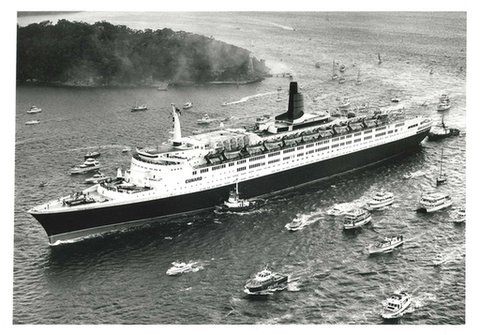
Image courtesy of The University of Liverpool Library, Cunard archive
April 1973
panic as Gaddafi threatens attack
The liner sets sail for Haifa to mark the 25th anniversary of the state of Israel, with Jewish passengers invited to celebrate Passover festivities onboard.
The QE2, however, soon finds itself at the centre of an international diplomatic crisis, with Libya’s leader Colonel Gaddafi threating to attack the ship in retaliation for Israel’s downing of a Libyan aircraft. The threat is taken seriously with 26 specially-trained commandos brought in to join the cruise.
The incident has been subject to much speculation since. Some historians credit Egyptian leader Anwar Sadat with talking Gaddafi down from carrying out his threat.
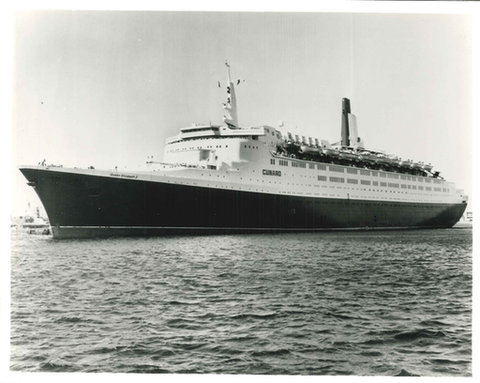
Image courtesy of The University of Liverpool Library, Cunard archive
25 March 1975
Through the Panama canal with a foot to spare
The QE2 makes its first passage through the Panama Canal. With less than a foot to spare as it passes through the canal locks, it is the biggest ship ever to pass through the famous canal.
May 1982
QE2 turned troop carrier
As conflict escalates in the Falklands between British and Argentinian forces, the QE2 is requisitioned from cruising duties by Margaret Thatcher’s government in order to transport 3,000 troops to the South Atlantic. They are joined 650 volunteers belonging to the Cunard crew.
In anticipation of service, much of the liner is reinforced with steel plating, while two helicopter pads are installed. It arrives back in Southampton June 11, on the whole unscathed.
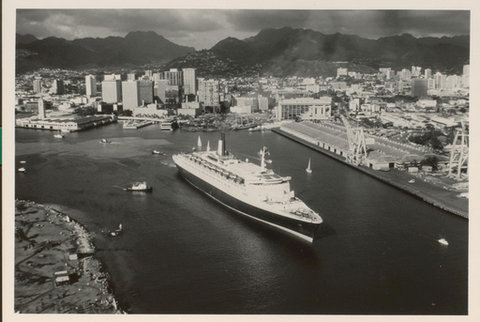
Image courtesy of The University of Liverpool Library, Cunard archive
11 September 1995
95ft waves strike
While in the North Atlantic, roughly 200 miles south of eastern Newfoundland, the QE2 runs into a rampaging Hurricane Luis.
While passengers are ordered to remain in their quarters, the ship’s bow is hit by a 95ft rogue wave at around 4am. From the vantage point of the bridge, the wave is akin to a large wall of water, leading Captain Ronald Warwick to comment later: “It looked as though the ship was headed for the white cliffs of Dover."
2007-2008
time to retire
In June 2007, Carnival, the Cunard Line’s owner, announces the QE2 is to be retired from service. The move is attributed to incoming regulations, including the International Convention for the Safety of Life at Sea, which would necessitate large and expensive levels of retrofitting to the vessel.
That same month, the vessel is bought for £50 million by Istithmar, the investment arm of Dubai World, which reveals plans for it to become a luxury floating hotel in the city state.
A farewell voyage is pencilled in for the following year, with the QE2 leaving Southampton docks for the final time on November 11, 2008, bound for the Gulf.
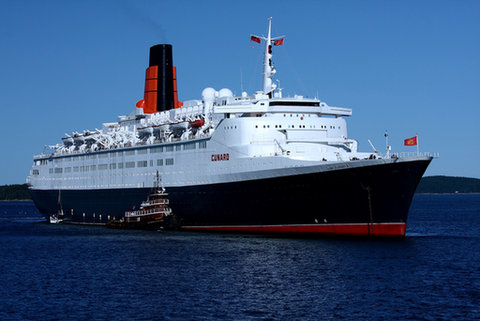
Stephan Backensfeld/shutterstock.com
18 April 2018
rest in peace, luxury floating hotel
After almost a decade of being moored at Dubai’s Port Rashid, in which it has remained inactive, the QE2 finally opens its doors as a luxury floating hotel.
According to owner PCFC Hotels, the renovation has brought the ship “back to life”, while retaining several of its original features, including porthole windows and paintings.
The launch puts to bed years of rumours in which the QE2 was supposedly bound for a Chinese scrapyard. Former London Mayor Boris Johnson is also said to have given his backing, whilst in office, for the QE2 to be returned “home” to the UK capital.
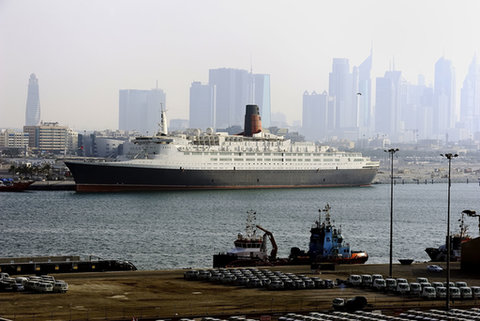
Editorial credit: / Shutterstock.com
2 May 2019
The QE2 celebrates its 50th birthday
To celebrate its anniversary, the QE2 puts on a show with a selection of theatre experiences and gala dinners. Cunard also launches the Queen Elizabeth cruise ship – the youngest vessel in its fleet – on a 17-night Mediterranean voyage, starting from Southampton, UK. Guests and former QE2 captains enjoy historical talks, gatherings of past passengers, and even QE2-inspired menus and quizzes.
“When QE2 came into service in the 1960s, many critics said she wouldn’t last a decade in the age of the jet, but her unique design as a dual-purpose ship meant that she was versatile enough to operate both as a transatlantic liner and a cruise ship,” said Cunard vice-president Angus Struthers prior to the voyage.
Ian McNaught, the last captain to ever set a course on the QE2, payed a fitting tribute to the perennial cruise liner: “QE2 has been gone for nearly a decade now, however on her 50th anniversary the memory of her is still strong.”